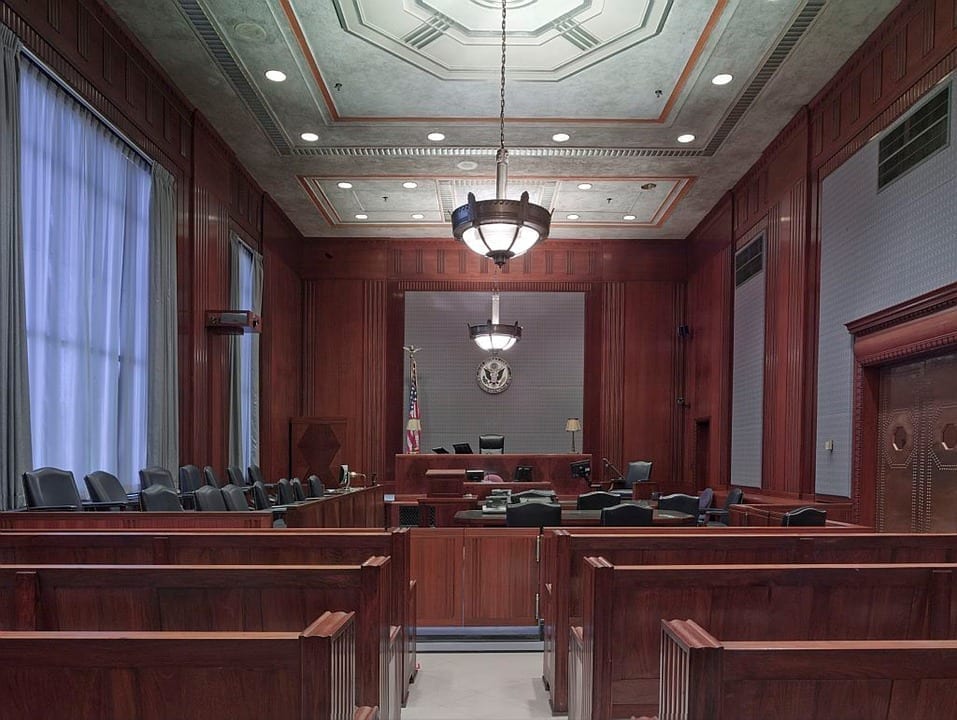California has 58 different trial courts and six appellate districts. All of them have different resources and capacities, making statewide COVID-19 operational orders impossible to implement and follow.
Given the Covid-19 pandemic, courts throughout California had a difficult time in 2020 balancing the public’s health and safety with the administration of justice. In early April, the state’s criminal courts implemented a policy of zero bail for misdemeanors and certain lower felonies in order to prevent the spread of COVID-19 in the state’s jails. In the civil courtrooms, eviction and foreclosure cases were placed on hold indefinitely. The types of hearings that were allowed to be held telephonically or on video were broadly expanded. Then, the COVID-19 numbers increased dramatically, and the administration of California courts went into a state of flux.
Pandemic Traffic Issues
The number of motor vehicles on California roadways with shelter-in-place advisories plummeted in early April of 2020. According to the California Highway Patrol (CHP), the silver lining in that cloud was that accidents dropped dramatically from more than 1,700 per week from February 10, 2019, down to 709 per week by July 6, 2020. Roadways with fewer vehicles on them only sped up some drivers though. According to one accident study, CHP citations issued to drivers who were traveling at speeds in excess of 100 mph increased by a startling 46%. As per DUI accidents, CHP numbers show those as being down 40 to 50% from the beginning of 2020.
The Traffic Court Reactions to the Pandemic
There is no uniform California traffic court order regarding closure of California traffic courts. Some counties are offering remote video hearings, while traffic courts in other counties are shut down until further notice. If someone receives a traffic ticket, they should check with the traffic court in the county where they received their ticket and obtain the status on the traffic case against them. There is additional self-help available on the California Courts website.
Bail Hearings After Arrest

The Sixth Amendment of the U.S. Constitution confers the right to the assistance of counsel for any defendant in a criminal case. One study conducted in 2010 in Cook County, Illinois determined that bail hearings by video denied defendants the right to an attorney. It also concluded that bail amounts for defendants in remote bail hearings were set at more than 50% higher than the amounts of defendants that had personal bail hearings. Cook County returned to in-person bail hearings after a lawsuit was brought against it. In 2014 in Baltimore, another study determined that defendants were also denied their right to an attorney in video bail hearings, but such hearings continue to this date. Unless otherwise agreed upon, in-person bail hearings are still he in California.
Criminal Prosecutions
For purposes of criminal charges, a defendant’s freedom is at stake. Pursuant to the Sixth Amendment, a person accused of a crime has the right to be able to confront any witnesses against him or her. This includes the right to be present at trial. Agreement must be obtained by a criminal defendant before any hearing in a criminal matter can be held remotely, especially for preliminary hearings when the prosecution is required to provide sufficient evidence to compel a defendant to stand trial. Whether it’s a preliminary hearing, a motion to suppress, a bench trial or a jury trial, defendants and their attorneys must be given a full opportunity to assess the demeanor and credibility of every witness in the case. A talking head on a television or computer screen just isn’t enough. Trial judges and jurors must also be given that same opportunity.
Civil Cases
With the Covid-19 crisis, case backlogs in California’s civil courts in 2021 continue to grow. The state’s SB 1146 operates to extend certain civil cutoff dates for 180 days beyond the time that the COVID-19 emergency is declared over. Domestic violence calls to police departments throughout Southern California are either at prior levels or even declining, but victims still need help from the courts. Domestic violence restraining orders can be obtained, but getting before a judge to get such an order during the COVID-19 pandemic can be problematic. The California courts are aware of the fact that victims of domestic violence need help right away. In recognizing that, every county in the state has arranged for a judge to be available during business hours for emergency protection or custody orders along with other domestic violence orders. Victims are encouraged to call 911 for assistance. In some counties, after a proper written petition form is completed and signed, police officers are authorized to seek a restraining order on a victim’s behalf.
Petitions for Injunctive Relief
Businesses are justifiably concerned about trade secrets, confidentiality agreements and unfair competition during the COVID-19 pandemic, especially when many employees are working with little or no supervision at home. The ability of a company to obtain a temporary restraining order (TRO) to protect it against irreparable harm can be critical to its livelihood. What comes to issue is whether a true emergency exists for a petitioner. Under the circumstances, with the incredible and growing backlog of cases that California courts are confronted with, they’re taking an even closer look at petitions for temporary restraining orders for purposes of determining whether indeed an emergency exists. Much depends on what county that a petition for injunctive relief is filed in. Many counties aren’t allowing oral argument on TRO petitions. Decisions are being made on the pleadings alone. Other counties just aren’t hearing TRO petitions right now.
Alternative Dispute Resolution
Most civil courtrooms for tort or contract cases in California are simply shut down. Some have reopened on a limited basis. They’re certainly not operating at the pace that they ran at in 2019 though. Those facts make alternative dispute resolution (ADR) an attractive alternative to both attorneys and clients. The providers of ADR aren’t governmental entities. They’re private companies with retired judges and private attorneys that perform the mediation and arbitration services. These companies are using remote technology to their advantage with no significant delays or disruptions. Long before the spread of COVID-19, courts favored the use of ADR. If it’s in the form of binding arbitration, courts are reluctant to reverse an ADR decision.
California has 58 different trial courts and six appellate districts. All of them have different resources and capacities, making statewide COVID-19 operational orders impossible to implement and follow. Municipal courts are preparing to reopen with guidance from local health officials. Expect rules and procedures to differ from courthouse to courthouse or even courtroom to courtroom.


Join the conversation!